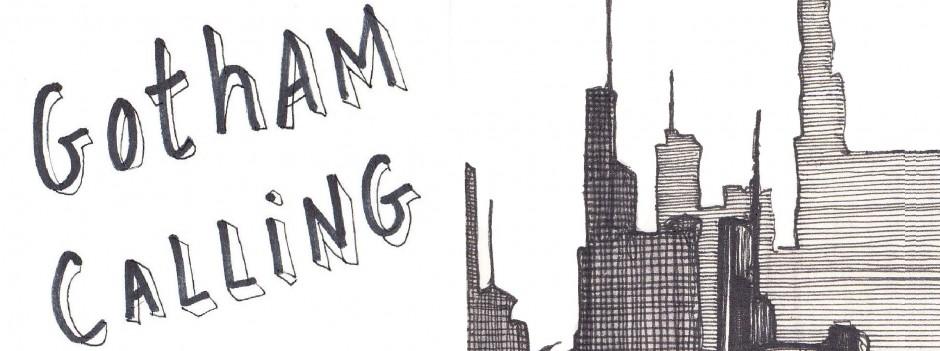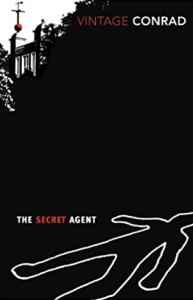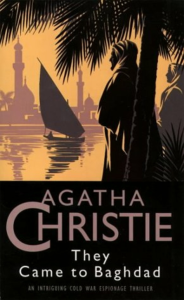I’ve written extensively about John le Carré in this blog, but today I want to go further back into the roots of spy literature. Here are a couple of very different novels by a couple of very different writers who only ventured into this genre occasionally, so they brought with them other literary sensibilities…
THE SECRET AGENT
(Joseph Conrad, 1907)
“Mr Verloc, going out in the morning, left his shop nominally in charge of his brother-in-law. It could be done, because there was very little business at any time, and practically none at all before the evening. Mr Verloc cared but little about his ostensible business. And, moreover, his wife was in charge of his brother-in-law.”
Revolving around a terror attack in 1886 London, set up by an agent provocateur working for a foreign (presumably Russian) embassy, The Secret Agent is not only an awesome read, but it’s usually considered one of the very first spy novels. You can easily find traces of its influence in many of the genre’s subsequent masterworks, from Alfred Hitchcock’s Sabotage (a very loose film adaptation of this book) to the intricate, introspective writings of le Carré.
It’s curious to see how many of the genre’s elements are already here: the tradecraft, the double (triple?) agent, the clash between mission and personal life, the ambiguous politics (including fascinating meditations on terrorism and anarchism), the twisty plot, the premise of using a ‘false flag’ bombing to promote securitarian measures, and the inner rivalries among the counterintelligence authorities.
And not only does Joseph Conrad bring this now-familiar underworld to life, but he already injects it with a sort of dark satire, from the ultra-seedy atmosphere where most of the action takes place (in case you’re wondering why Verloc’s shop has practically no business before the evening, it’s because he sells pornography) to the magnificently grotesque characters, such as Michaelis, a verbose anarchist out on parole after years in prison:
“He talked to himself, indifferent to the sympathy or hostility of his hearers, indifferent indeed to their presence, from the habit he had acquired of thinking aloud hopefully in the solitude of the four whitewashed walls of his cell, in the sepulchral silence of the great blind pile of bricks near a river, sinister and ugly like a colossal mortuary for the socially drowned.
He was no good in discussion, not because any amount of argument could shake his faith, but because the mere fact of hearing another voice disconcerted him painfully, confusing his thoughts at once – these thoughts that for so many years, in a mental solitude more barren than a waterless desert, no living voice had ever combatted, commented, or approved.”
The fun of reading The Secret Agent doesn’t rely merely on spotting how it anticipates later works and tropes. Rather, this is a genuinely great spy thriller. Besides an engaging depiction of the intelligence milieu, the book has an elaborate structure that plays around with a non-linear chronology and with multiple viewpoints. The shifting perspectives – sometimes within a single paragraph – are particularly satisfying, removing a clear moral ground and asking readers to identify with different figures of the eccentric cast. Even the tone isn’t set in stone, ranging from lengthy quasi-philosophical conversations to intimate character pieces… In the incredible final stretch, the mood suddenly turns from a suspenseful narrative about a woman on the run from the police into a macabre comedy of errors involving a corpse (no wonder Hitchcock got interested in this material!).
Joseph Conrad’s witty prose is a delight from start to finish, constantly coming up with colorful, Alan Moore-ish turns-of-phrase to depict each physical and mental process, including plenty of hilariously sarcastic descriptions and some downright weird expressions (‘Comrade Ossipon might have been said to be terrified scientifically in addition to all other kinds of fear.’). For instance, I love this moment when Conrad captures the psychology of a nihilistic terrorist coming face to face with a policeman:
“The unwholesome-looking little moral agent of destruction exulted silently in the possession of personal prestige, keeping in check this man armed with the defensive mandate of a menaced society. More fortunate than Caligula, who wished that the Roman Senate had only one head for the better satisfaction of his cruel lust, he beheld in that one man all the forces he had set at defiance: the force of law, property, oppression, and injustice. He beheld all his enemies, and fearlessly confronted them all in a supreme satisfaction of his vanity. They stood perplexed before him as if before a dreadful portent. He gloated inwardly over the chance of this meeting affirming his superiority over all the multitude of mankind.”
THEY CAME TO BAGHDAD
(Agatha Christie, 1951)
“Captain Crosbie came out of the Bank with the pleased air of one who has cashed a cheque and has discovered that there is just a little more in his account than he thought there was.
Captain Crosbie often looked pleased with himself. He was that kind of man. In figure he was short and stocky, with rather a red face and a bristling military moustache. He strutted a little when he walked. His clothes were, perhaps, just a trifle loud, and he was fond of a good story. He was popular among other men. A cheerful man, commonplace but kindly, unmarried. Nothing remarkable about him. There are heaps of Crosbies in the East.”
Like many people, I went through an Agatha Christie phase back in my teens, binge-reading dozens of her entertaining mystery novels. Curiously, though, one of the few that stuck with me was The Man in the Brown Suit, which didn’t star any of Christie’s popular recurring protagonists (like Hercules Poirot or Miss Marple) and, in fact, was more of a globetrotting adventure yarn than her typically quaint tales of detection (although it did feature a pretty clever whodunit among all the cloak and dagger). Recalling how much fun I had with that story back in the day, I figured it was time to chase down Christie’s other spy thrillers.
They Came to Baghdad starts by piling up so many plot threads that at first you may be forgiven for wanting to take down notes and perhaps draw some kind of visual scheme linking all the cast. Christie, after all, was used to writing for puzzle-solvers… Soon, though, the story settles on Victoria Jones, a peppy young compulsive liar who travels to Baghdad on a romantic whim, only to find herself embroiled in a global conspiracy. Cue in a convoluted string of mistaken identities, daring escapes, fatal coincidences, and coded messages whispered by dying breaths.
Unlike Conrad’s, Agatha Christie’s prose is quite unadorned – though not devoid of wit – with short, simple sentences giving you the necessary information to move the plot along. The lighthearted tone suggests complicity with the readers, as if a good friend is telling us the story (I mostly associated Christie with first-person narrations, so it was nice to rediscovered her ‘objective’ voice). She also pulls off a nice balance between internal action and more visual set pieces, described in an almost cinematic style, like in this Hitchcockian scene:
“On the shelf in front of Carmichael was a big copper coffee pot and that coffee pot had been recently polished to the order of an American tourist who was coming to collect it. The gleam of the knife was reflected in that shining rounded surface – a whole picture, distorted but apparent was reflected there. The man slipping through the hangings behind Carmichael, the long curved knife he had just pulled from beneath his garments. In another moment that knife would have been buried in Carmichael’s back.
Like a flash Carmiachael wheeled round. With a low flying tackle he brought the other to the ground. The knife flew across the room.”
There is a whole body of literary theory distinguishing between thrillers and mysteries, going at least as far back as a 1934 article by the critic Dorothy L. Sayers, who framed these genres as prompting different questions from the readers: in thrillers, we ask mostly ‘What comes next?’ and in mysteries ‘What came first?’, so that the former are more about anticipating the future and the latter about curiosity over the past. Naturally, thrillers can contain mysteries and mysteries can contain thrills, but it’s a matter of emphasis. And with They Came to Baghdad, Agatha Christie, who throughout her highly prolific career specialized in detective stories, proved she too could build an exciting narrative rooted in suspense – and suspense not just about what’s going to happen to Victoria, but about what’s going to happen to the whole damn world!
In fact, since the book was written at the outset of the Cold War, I find its worldview particularly interesting, including the impression that Christie doesn’t take the conflict’s future for granted. The premise rests on the notion that, yes, there is growing tension between Russians and Americans, communists and capitalists, but it doesn’t have to be this way (‘everything depends on those who hold those two divergent viewpoints, either agreeing to differ and each contenting themselves with their respective spheres of activity, or else finding a mutual basis for agreement, or at least toleration’). Applying – already at the time – a formula that would fuel plenty of Cold War fiction (from the James Bond yarns to the flood of Eurospy films in the 1960s), the real enemy is a third party, with secret headquarters, that’s been stirring up the rivalry between the superpowers in order to facilitate its owns designs for world domination.
So, yeah, I’m not going to lie: while this is a breezy read with an amusingly ultra-intricate plot, what most appealed to me were its historical traces. We get travelogues of early 1950s Iraq, including a nice sequence at an archaeological dig. There are also all these charming passages suggesting that, in a time before mass tourism, Christie knew she was writing for people who had never travelled abroad or been in an airplane, hence this vivid – and informative – description:
“During what seemed an age the plane taxied along the aerodrome, then it turned slowly around and stopped. The engines rose to a ferocious roar. Chewing-gum, barley sugar and cotton wool were handed round.
Louder and louder, fiercer and fiercer. Then, once more, the aeroplane moved forward. Mincingly at first, then faster – faster still – they were rushing along the ground.
‘It will never go up,’ thought Victoria, ‘we’ll be killed.’
Faster – more smoothly – no jars – no bumps – they were off the ground skimming along up, round, back over the car park and the main road, up, higher – a silly little train puffing below – doll’s houses – toy cars on roads… Higher still – and suddenly the earth below lost interest, was no longer human or alive – just a large flat map with lines and circles and dots.
Inside the plane people undid their safety-belts, lit cigarettes, opened magazines. Victoria was in a new world – a world so many feet long, and a very few feet wide, inhabited by twenty to thirty people. Nothing else existed.”


